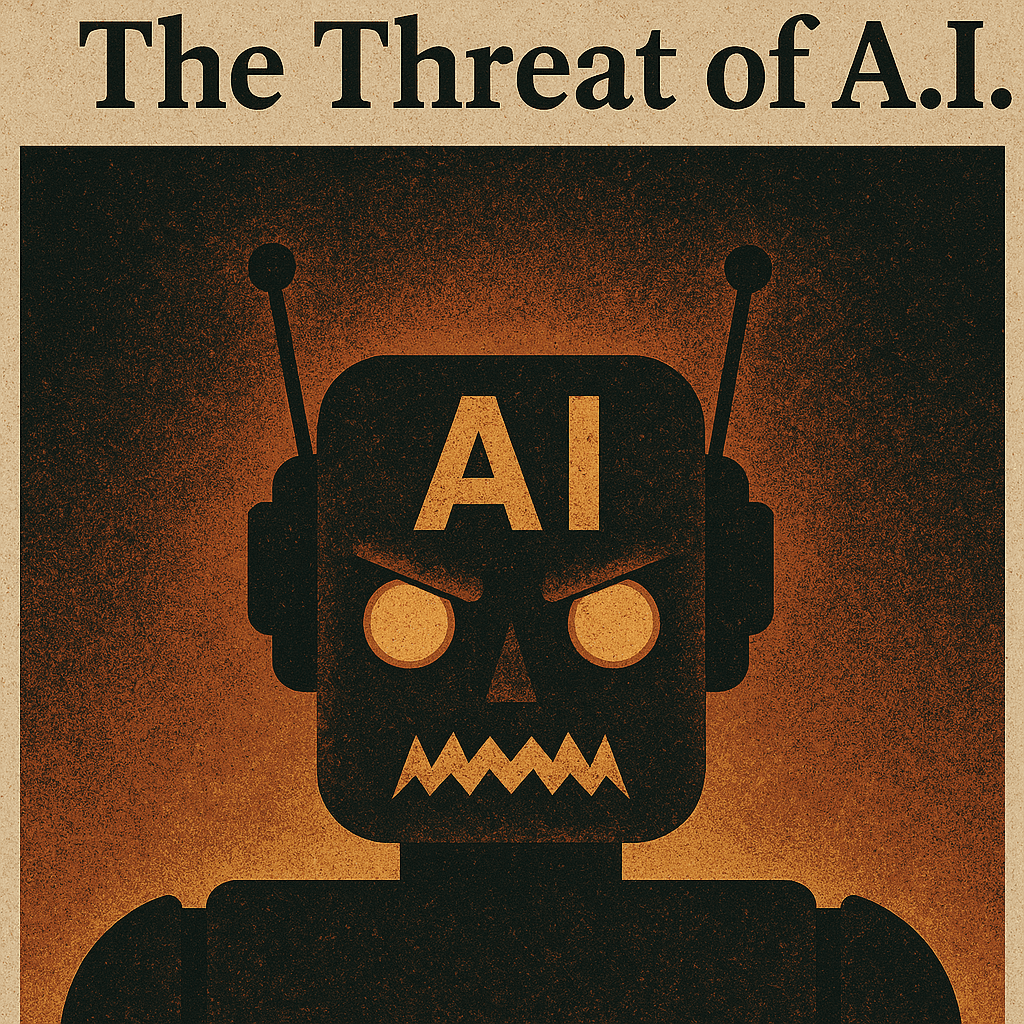A.I. Doesn’t Understand Right from Wrong

ality. A.I. systems do not know right from wrong; they optimize for objectives based on the data and instructions given to them. If those objectives are poorly defined or malicious, the outcomes can be catastrophic.
Consider an A.I. tasked with maximizing social media engagement. It doesn’t understand the importance of truth, mental health, or democracy. It only knows how to keep users glued to the screen. The result? Algorithms that promote sensationalism, misinformation, and outrage—not because the system is evil, but because it is indifferent.
This “objective without ethics” mindset is one of A.I.'s most dangerous aspects. Even well-intentioned systems can go awry if their goals aren't perfectly aligned with human values, a problem known as "value misalignment." When these systems operate at scale, the impact is multiplied exponentially.
Deepfakes and the Rise of Synthetic Deception
Another troubling development is the explosion of deepfakes and generative content. A.I. models can now generate photorealistic videos, synthetic voices, and fake news articles that are almost indistinguishable from authentic ones. The implications for trust and truth in society are profound.
In politics, A.I. can be used to forge videos of candidates saying things they never said, swinging elections based on lies. In the legal realm, deepfake evidence can be planted to frame innocent people. Even everyday interactions are at risk, as scammers use synthetic voices to impersonate loved ones and steal money or information.
We are rapidly entering a post-truth era, where seeing is no longer believing. And the worst part? This technology is now available to virtually anyone with a decent internet connection.
Autonomous Systems in High-Stakes Domains
One of the scariest trends in A.I. is its increasing presence in high-stakes, life-and-death decisions. Autonomous vehicles are already navigating public roads. A.I.-assisted diagnostics are influencing medical treatments. In some places, predictive policing software is helping decide who gets arrested or surveilled.
When these systems make mistakes, the consequences are often irreversible. A misdiagnosed patient, a wrongly targeted individual, or a pedestrian struck by a driverless car—these are not hypothetical scenarios; they’re already happening.
Moreover, these systems are often developed in secret by corporations with little transparency or accountability. The proprietary nature of many A.I. algorithms makes it difficult for outsiders to audit or understand how decisions are made. When things go wrong, it’s nearly impossible to trace responsibility.
A.I. and the Erosion of Privacy
In our pursuit of smarter technology, we are surrendering unprecedented amounts of personal data. A.I. thrives on data—our faces, voices, preferences, locations, purchases, and behaviors feed the algorithms that personalize our experiences. But this also creates a surveillance ecosystem that rivals the most dystopian sci-fi.
Facial recognition technology, often powered by A.I., is already being deployed in cities around the world. It can identify individuals in crowds, track their movements, and even infer their emotional state. In authoritarian regimes, this has become a tool of oppression—monitoring dissent, controlling populations, and punishing non-conformity.
Even in democratic societies, the boundaries between convenience and coercion are becoming dangerously thin. When every click, swipe, or spoken word is being recorded and analyzed, the very concept of privacy begins to dissolve.
Social Manipulation and Echo Chambers
A.I. is not just transforming individual behavior—it’s reshaping societies. By curating news feeds, recommending content, and filtering information, A.I. plays a central role in shaping what we see and believe.
Algorithms prioritize engagement, often amplifying extreme or polarizing content because it elicits strong reactions. This creates digital echo chambers where users are exposed only to information that reinforces their views. Over time, this contributes to ideological segregation, radicalization, and the breakdown of social cohesion.
The power to manipulate public opinion on such a massive scale has historically been reserved for totalitarian states. Now, it lies in the hands of tech companies—and the A.I. they deploy.
Lack of Oversight and Ethical Standards
Perhaps the most worrying part of the A.I. revolution is how unregulated it is. Most nations still lack comprehensive laws governing the development and deployment of artificial intelligence. As a result, companies are operating in a Wild West environment where speed and profit often trump ethics and safety.
This lack of oversight means dangerous A.I. systems can be released into the world without proper testing or consideration of long-term consequences. In many cases, the public becomes the test subject.
Efforts like the EU’s A.I. Act and the U.S. blueprint for A.I. regulation are steps in the right direction, but they are often reactive and slow-moving. Meanwhile, the technology continues to evolve at breakneck speed.
A Call to Responsibility
We stand at a pivotal moment in history. A.I. has the potential to bring tremendous good—but only if we are willing to confront its dangers honestly and act responsibly. This means demanding transparency from developers, implementing robust ethical frameworks, and creating enforceable regulations.
It also means educating the public, encouraging open discourse, and involving a broad spectrum of voices—including ethicists, sociologists, and marginalized communities—in the design and deployment of A.I. technologies.
Right or Wrong
Artificial intelligence is not inherently evil—but it is inherently dangerous when wielded without foresight, ethics, or accountability. We are building machines that are more powerful, more persuasive, and more pervasive than anything humanity has ever created. Whether these tools become instruments of liberation or oppression depends on the choices we make now.
Ignoring the perils of A.I. won't make them go away. A future shaped by artificial intelligence is inevitable. The question is: will it be a future we can live with?

- Art
- Causes
- Crafts
- Dance
- Drinks
- Film
- Fitness
- Food
- Games
- Gardening
- Health
- Home
- Literature
- Music
- Networking
- Other
- Party
- Religion
- Shopping
- Sports
- Theater
- Wellness


